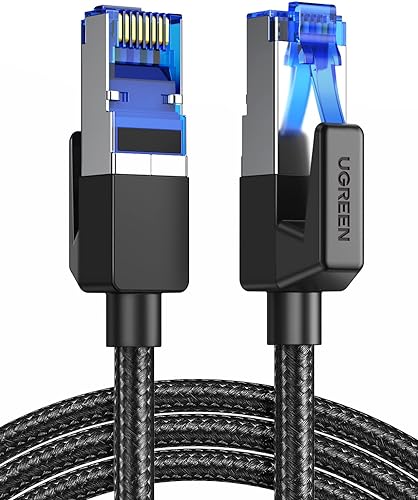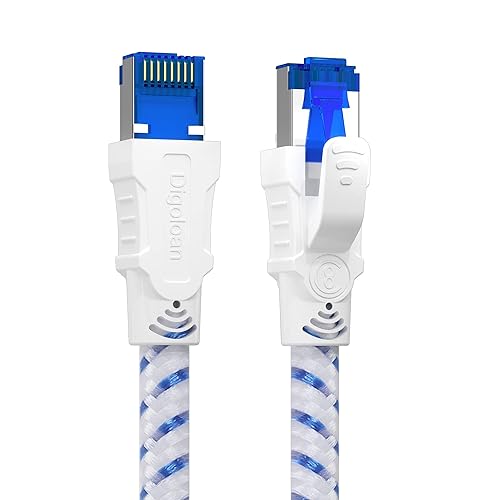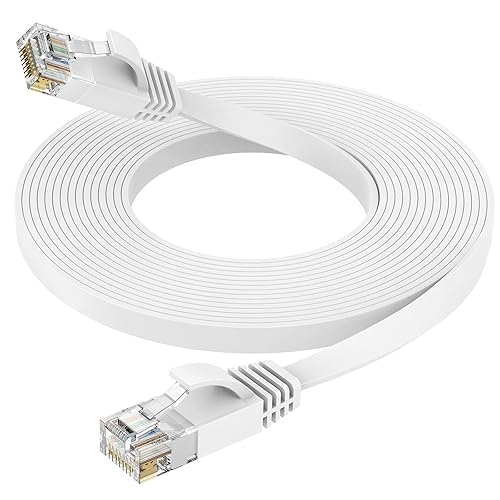How to Choose an Ethernet Cable in 2025? Guide and Comparison
Choosing a good Ethernet cable can optimize network performance for both professional and home environments. Whether it's for smooth streaming, lag-free online gaming, or uninterrupted remote work, determining the right Ethernet cable is essential to realizing your network's full potential.
Our TOP 3
UGREEN

Pros
- Excellent 40Gbps speed
- Durable braided nylon construction
Cons
- Cable rigidity
Specs
Digoloan

Pros
- Compatible with many devices
- High-quality materials
Cons
- No notable cons mentioned
Specs
Selection Criteria
Cable Category
Ethernet cables are classified into categories, commonly abbreviated as "Cat", which determine their performance capabilities. Here are the most common categories:
- Cat 5e: Supports up to 1 Gbps and is suitable for most standard home applications.
- Cat 6: Supports up to 10 Gbps over short distances (up to 55 meters) with better protection against interference.
- Cat 6a: Extends Cat 6 capabilities to 10 Gbps over 100 meters, ideal for business networks.
- Cat 7 and Cat 8: Support speeds of 10 to 25/40 Gbps respectively, with superior shielding to minimize interference. Perfect for infrastructures requiring very high performance.
Cable Length
The length affects signal strength. Choose a length just sufficient to reach your equipment to minimize potential losses. Cat 6 and higher cables maintain performance over longer distances.
Type of Shielding
Shielding prevents electromagnetic interference and radio frequency interference:
- UTP (Unshielded Twisted Pair): Unshielded, suitable for home use with little environmental interference.
- STP (Shielded Twisted Pair): Shielded, recommended for environments prone to interference.
- FTP (Foiled Twisted Pair): Offers shielding against external interference for each wire pair, ideal for industrial settings.
Connectors
Ensure that the connectors are well reinforced and gold-plated for better conductivity and to prevent corrosion. A good connector ensures stable and reliable data transmission.
Common Mistakes
Choosing the Wrong Category
Selecting an inappropriate category for the intended use can limit your network's performance. Ensure the cable meets the speed and bandwidth requirements of your equipment.
Ignoring the Installation Environment
Ignoring environmental conditions can lead to malfunctions. Use shielded cables in environments with high levels of electromagnetic interference.
Underestimating Compatibility
Before purchasing, verify that your network devices (like routers and switches) are compatible with the chosen Ethernet cable category to avoid ports that limit performance.
Comparison of our 3 favorite products
UGREEN- Exceptional speed with solid construction

The UGREEN Cat 8 Ethernet cable is perfect for those seeking extraordinary network performance. Offering a super speed of up to 40Gbps, this cable is ideal for work or gaming environments that demand a fast and reliable internet connection. Its braided nylon construction protects against damage and ensures long lifespan.
Pros
- Supports extremely high speeds up to 40Gbps
- Sturdy braided nylon construction
- Compatible with a wide range of devices
Cons
- Slight rigidity due to nylon coating
Digoloan- Extended compatibility with a consistent throughput

The Digoloan Cat 8 Ethernet cable combines compatibility with high-level performance, offering speeds up to 40Gbps and a 2000MHz bandwidth. With its PVC construction and double shielding, it's an ideal choice for stable and fast connections, suitable for online gaming or HD streaming.
Pros
- Excellent 40Gbps speed with signal stability
- Durable materials and attractive design
- Versatile and compatible with many devices
Cons
- No notable cons mentioned
Ercielook- Flat design for a discreet integration

The Ercielook Cat 6 cable is designed for those needing a discreet solution without sacrificing performance. Thanks to its flat design, it fits perfectly in tight spaces while providing fast connectivity with speeds up to 1Gbps, perfect for home or office use.
Pros
- Easy installation thanks to flat design
- Good durability with a speed of 1Gbps
- Saves space by being easily hidden under carpets or behind furniture
Cons
- Not compatible with the very high speeds required by Cat 8 networks
Practical Tips
Anticipating Future Developments
To anticipate future technological developments or your needs, choose a cable with a slightly higher category than your current needs. This will prevent you from having to replace cables during a future network upgrade.
Outdoor Use
For cables installed outdoors, opt for cables with UV and water-resistant sheathing to prevent rapid deterioration.
Test After Installation
Once the cable is installed, test your network to ensure that the expected transfer speeds are indeed reached. Use network diagnostic tools to detect any potential issues.
FAQ
See also: